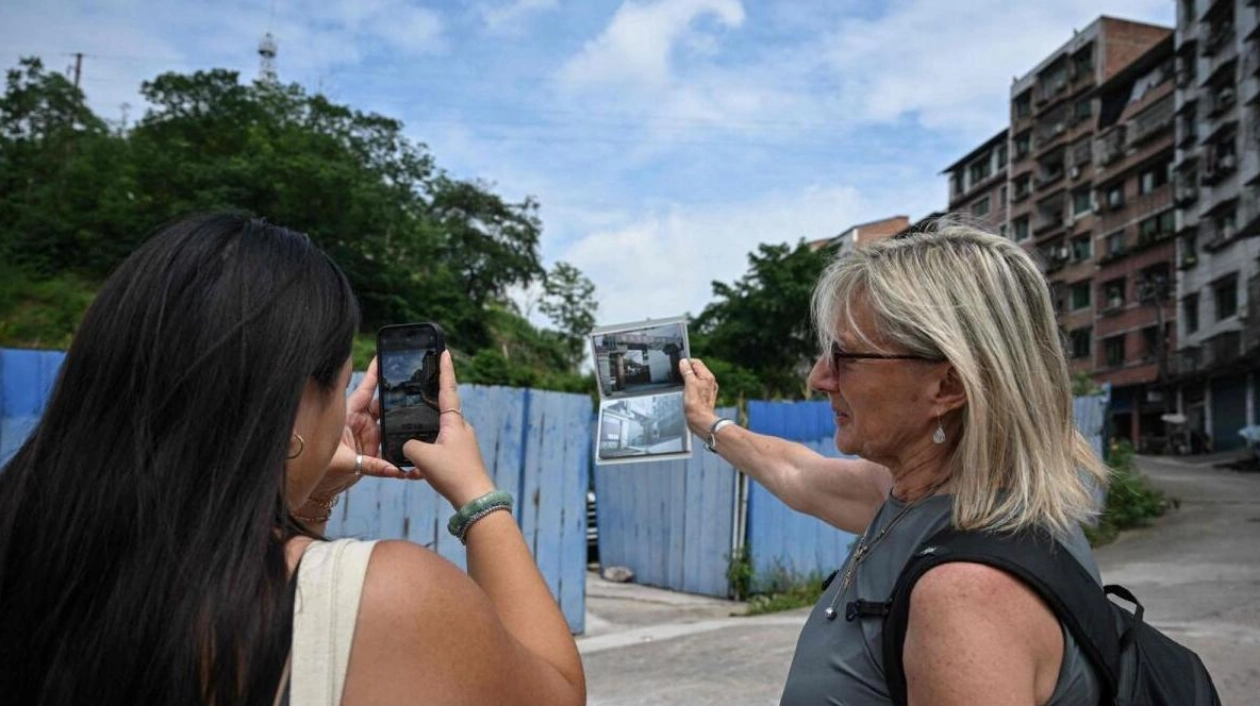In a vacant concrete lot in southwest China, Loulee Wilson gathers a handful of stones into a bag -- a keepsake from the place where she believes she was abandoned as a baby. Wilson, an American college student, was born in China but was given away by parents who were likely afraid of breaking the country's one-child policy, which penalized families for having more than one child until it was abolished in 2016. Shortly after her birth, she was discovered outside a factory that has since been demolished in the town of Dianjiang, taken to an orphanage, and later adopted by a couple in the United States. Now 19, she is part of a growing group of Chinese adoptees returning to their birth country to find their biological parents and understand their origins.
"If I find them, that would be amazing. But I'm not sure if I'll be able to," she said. "It would help me learn more about my story." According to State Department figures, over 82,000 children born in China have been adopted by American families since 1999, mostly girls due to a cultural preference for boys in China. Many were relinquished in the 2000s when Beijing strictly enforced birth restrictions and had more lenient laws regarding overseas adoptions. As these children grow up, they are creating a significant demand for reunions with their birth families, said Corinne Wilson, Loulee's adoptive mother. She is the founder of The Roots of Love, one of several organizations established in recent years to help adoptees reconnect with relatives in China.
In June, the Wilsons embarked on a quest to find birth families in rural Dianjiang, about 150 km from the megacity of Chongqing. They distributed flyers with Loulee's and other adoptees' names, ages, and photographs, encouraging people who had given away children to provide DNA samples. Finding a match is challenging due to incomplete record-keeping, language barriers, fading memories, and local suspicion of potential scams. Some communities are reluctant to revisit the painful past hidden in the tranquil villages and rice paddies, where birth quotas were strictly enforced. Under the one-child policy, which varied in its restrictions, couples in Dianjiang were often allowed a second child if the first was a girl. However, officials rigorously enforced the rules, threatening to demolish homes, seize farm animals, and impose hefty fines, according to villagers.
"We were forced into it. We had no choice," said carpenter Yi Enqing, 57, who hopes to find his daughter, given up for adoption in the early 1990s. "I'm afraid she won't accept us now. She must feel some resentment," he said in his workshop covered in sawdust. In one village, a middle-aged man provided a saliva sample while his wife tearfully remembered their daughter, last seen as a baby in 1990. "I've searched for so long but can't find her," she said as a Roots of Love volunteer carefully sealed the sample. "I never wanted to send her away," she added. The couple requested anonymity to protect their privacy. The samples are sent to a laboratory for DNA extraction and comparison with existing databases. If a match is found, The Roots of Love facilitates contact between long-lost relatives.
Reunions can evoke mixed emotions for adoptees, who often face mental health challenges related to identity and racial discrimination. "Many Chinese adoptees experience racial or cultural dissonance growing up in predominantly white environments," said Grace Newton, a researcher at the University of Chicago who studies transracial and transnational adoption. "It's about losing your identity, your birth culture, your birth language, your biological family," said Cassidy Sack, an adoptee volunteer with the US-based Nanchang Project, which has reunited dozens of birth families since 2018. "That was the life you were meant to live. Then, decisions were made for you, and you were taken to a new country." China introduced the one-child policy in 1979 to prevent uncontrolled population growth. It is estimated to have prevented hundreds of millions of births but has been criticized for its enforcement, including forced contraception, abortions, and sterilizations. The policy also contributed to increased infanticide rates, child trafficking, and a gender imbalance in China.
The policy caused "serious mental trauma to many Chinese people," said independent demographer He Yafu. Beijing relaxed birth restrictions in 2016, allowing Chinese couples to have three children since 2021. However, the country's birth rate continues to decline, leaving fewer young people to care for an aging population. For the Wilsons, the search for Loulee's birth parents continues. "I just want them to know that I'm happy and healthy and grateful for the life I'm living," Loulee said.






